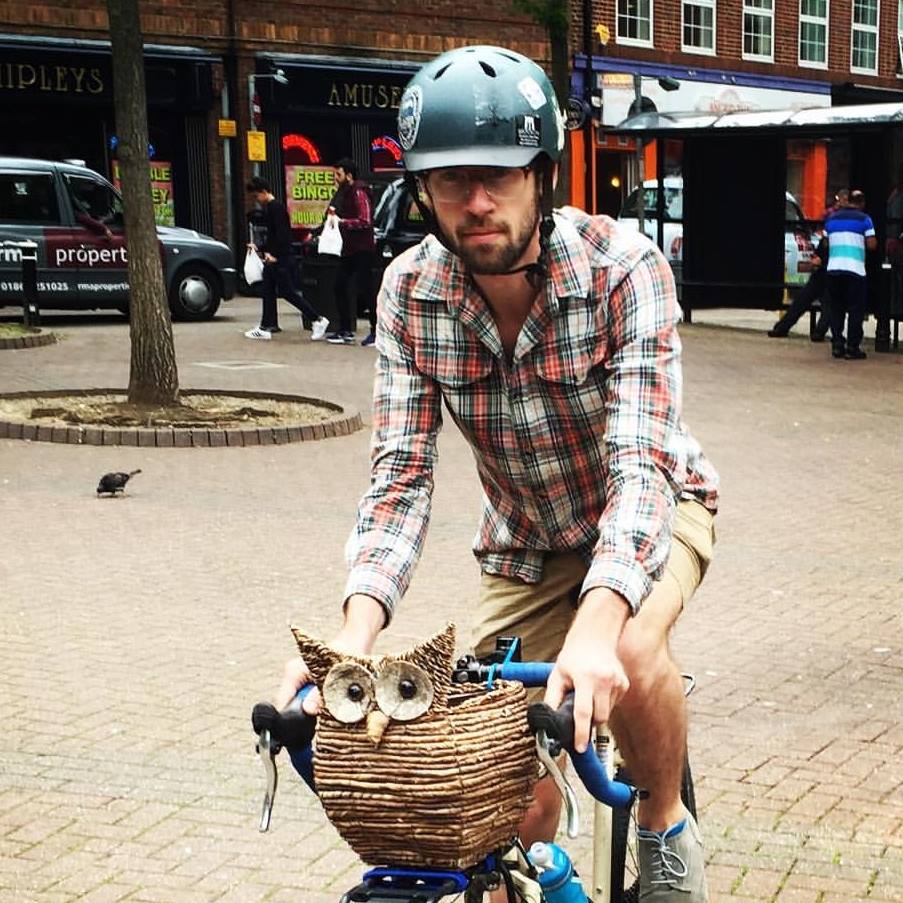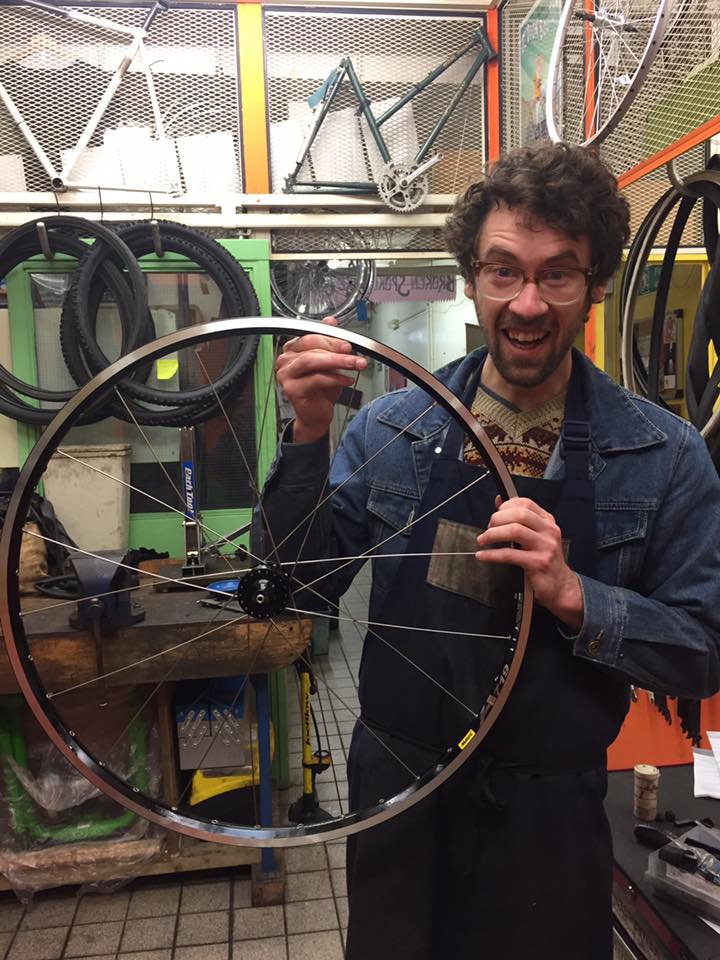The time we’re living through now encourages reflection. What is really important to us? What relationships, activities, and things do we actually need to keep us healthy and happy? What kind of community and society do we want to rebuild out of this…and what can we let go of? For many of us, living under lockdown has stripped away the patterns and routines of our normal lives and left us with space to rethink.
So we’ve been thinking…do community bike projects matter? Do we need them to weather this crisis and come back fighting? If the Broken Spoke is going to face down the bumpy road ahead we’re going to need some motivation – we need to remind ourselves and the world what the point is. To help, we’ve asked some close friends of the project to tell us what community bike projects like Broken Spoke mean to them. We’ve been hard hit by COVID and we need your support now more than ever. We hope these stories will inspire you to commit to a monthly donation to Broken Spoke to keep us going and allow us to continue our vital work in our community.
This weeks story comes from long-time volunteer at The Spoke, Mike Hicks.
I walked into Broken Spoke four years ago as a lost american with a bag full of pieces of my bike. The place was magical: bike parts hung from the rafters, tools seemed to be growing on the walls, and everywhere I looked someone was screwing or hammering or oiling. I was greeted by an extremely hairy and exuberant mechanic; I didn’t know it, but I’d found one of my first friends in a new city, and taken the first steps towards making Oxford my home.

Bicycles have not just been a mode of transportation in my life, they’ve also always been a way to create friendships and community. Broken Spoke has been an important part of making Oxford my home. As more and more people move around for work, community bike workshops serve an important role in giving ‘transplants’ to a city with a way to put down roots. Let me tell you a bit about how they’ve enriched my life by teaching me way more about fixing bikes than I could have found out on my own – but more importantly, by connecting me to the people with whom I live, and giving me a way to give back to my new neighbors.
Giving you (and me) skills
I had heard about community bike projects before moving to Oxford; once, while on a long bike tour, I did extensive repairs at Portland’s Bike Farm. The friendly people at the Bike Farm carefully worked me through some really tricky repairs, including replacing my shifting mechanism. This didn’t just give me a skill – it also made me more confident riding longer distances. This was a real life-changer for me: before that experience, I had thought of the workings of a bicycle as a deep mystery, knowledge held an arcane priesthood of ordained bike mechanics. After visiting a community bike workshop, I realized that most working parts of a bike are on the outside, and so with a little help anybody can figure out what they’re doing.

I started looking for bike co-ops whenever I needed something done on my bike; when I moved back to New York I visited New York’s Time’s Up! Bike Co-op to buy used parts and sometimes borrow tools. These everyday repair projects were key in changing me from a bicycle commuter to a self-identified cyclist. I am sure that people who come into the spoke feel the same way, and if they leave Oxford and move to somewhere else with a bike project, whether it’s Bristol, Cologne, or Philadelphia, they’ll find a way to make that place a home as well.
Creates community
Moving to a new city is difficult; it’s even more difficult when the city is in a different country, with all of the slight cultural differences that entails. My experience of this isn’t unique: 28% of Oxford’s residents were born outside of the UK. Being in a new country is literally alienating: the food is different (why are the beans on the toast??), the customs are different (tea preparation is a whole thing here), people speak and act just a little off from what you expect. You often feel like you’re doing something wrong and you worry that you look weird doing what you think is normal. The Spoke gave me, and lots of other new transplants from distant spots, a place to see that we more or less fit in, and when we don’t nobody really cares.
I found Broken Spoke in the first month I moved here; after another month, I had gone on a couple of bike rides with people I met through ‘the Spoke’. Soon, I started volunteering at the Spoke; this taught me much more about fixing bicycles than I ever would have learned on my own. But more importantly, it put me in touch with my neighbors.
I met people of all ages, and from all sorts of places ––Those sorts of interactions made me feel like I knew my neighbours. Community bike workshops have a unique ability to knit together the different parts of a city; no other space brings together people of all generations and backgrounds. Without the Spoke I probably never would have met anyone who didn’t work where I did, or anyone who wasn’t my age; bike projects like the Spoke connect people who would never have crossed paths at work, in shops, or in pubs.
Giving people an opportunity to give back
As a volunteer my favorite people to work with were new cyclists changing their first flat tyre. Everyone gets flats, and if you don’t know what to do with them they can leave you stranded far from home. Fixing a flat is the kind of skill that really expands a person’s ability to use their bike; when you know how to patch a puncture, you feel a lot more comfortable taking long rides and exploring new parts of your city or country that you wouldn’t have seen on foot or in a car. Also, repairing tubes takes time but isn’t too tricky, so it gave me an opportunity to chat with whoever had come by.
But being part of a community involves contributing to the community. Having an opportunity to help out gives new residents a way to feel invested in their new community. Every now and then when I’m biking around Oxford, I see people I met working on bikes in the spoke, or recognize a bicycle I’ve seen having its bottom bracket switched out on one of the workstations. I’m sure other volunteers feel this way too – when you see how your work benefits others, you feel more connected to them and to the well-being of your community generally.
I would advise everyone to volunteer at a community bike workshop if they can–it’s a fun way to give to yourself and to your community. Sadly, the current pandemic crisis makes this impossible for nearly everyone. In the meantime, then, I hope you join me in donating, to keep these magical places going until we can all be together in them again.
Mike Hicks
We’ve asked some close friends of the project to tell us what community bike projects mean to them, by creating a series of blog posts. We hope these stories will inspire you to commit to a monthly donation to Broken Spoke.
If you can’t commit to a regular donation, we still welcome anything you are able to give at this time. Your financial contributions can go a long way towards getting more people fixing & riding bikes.

